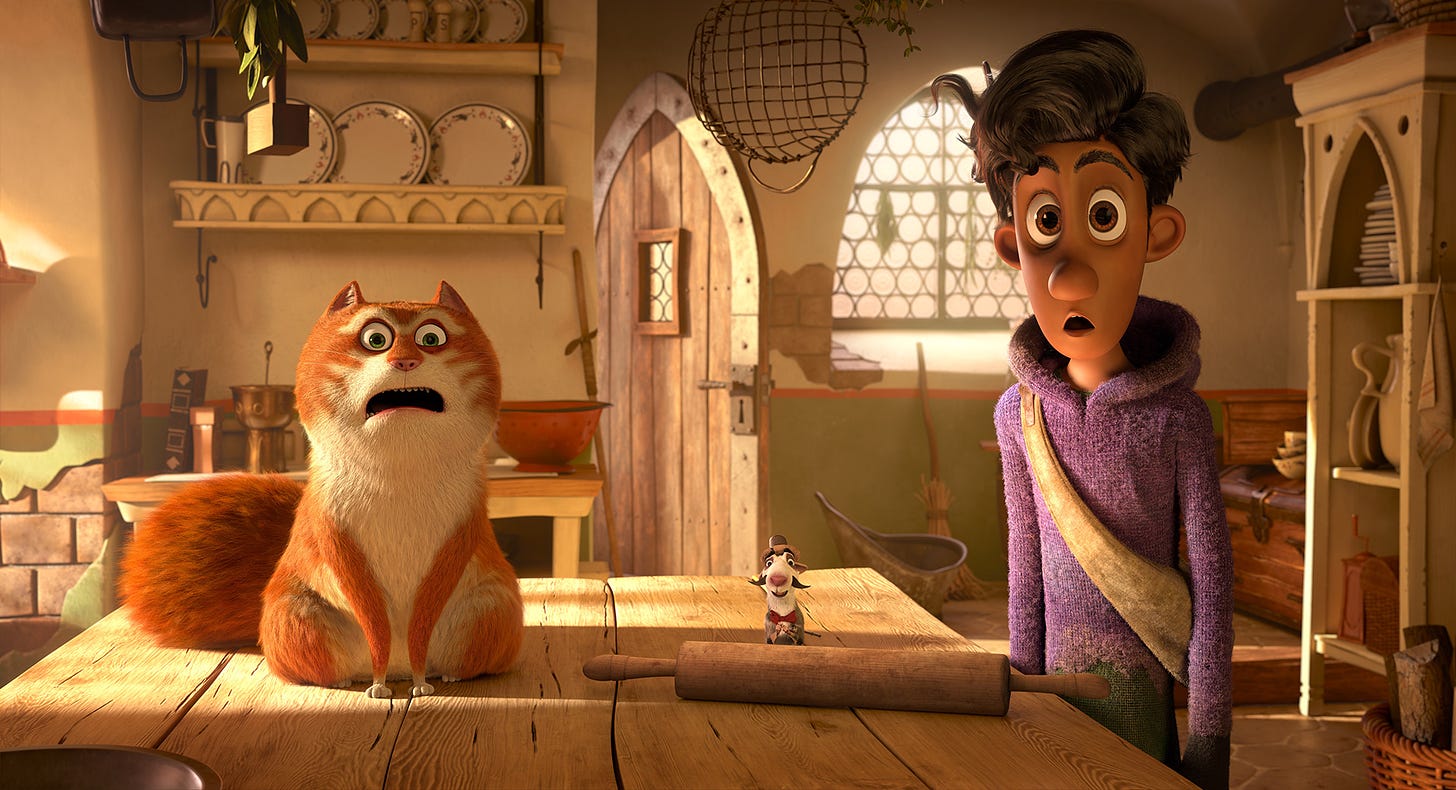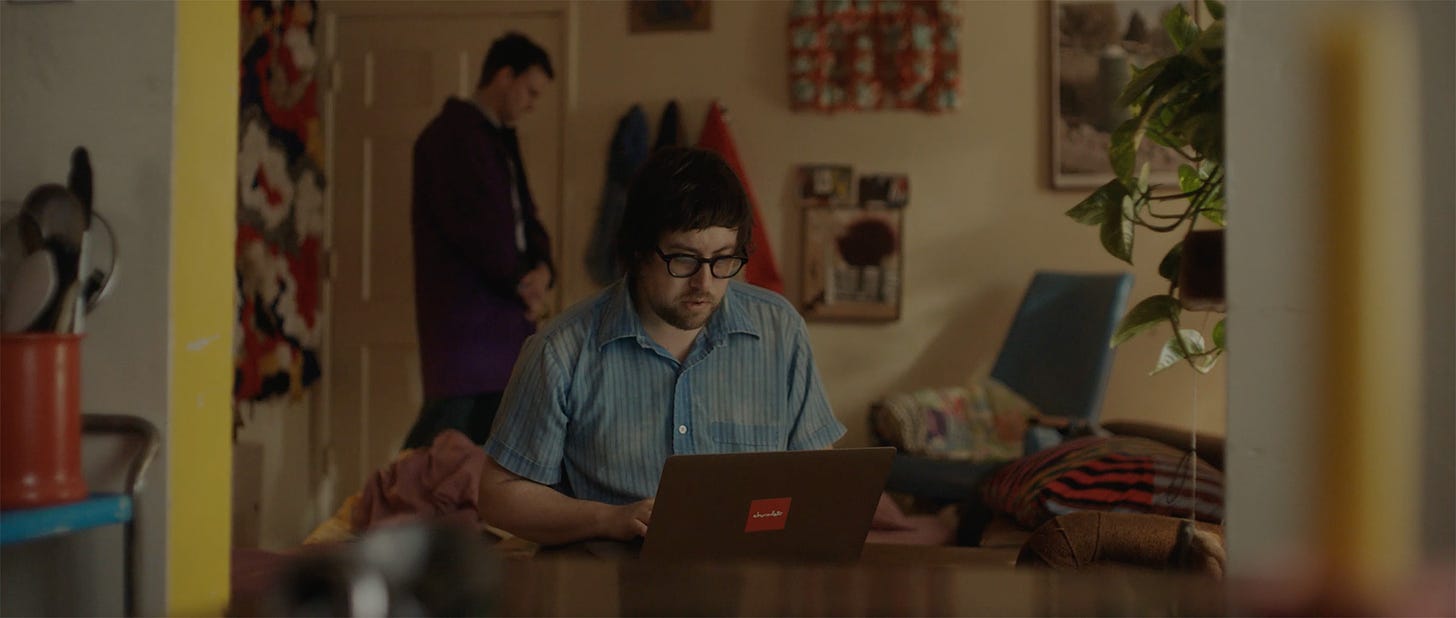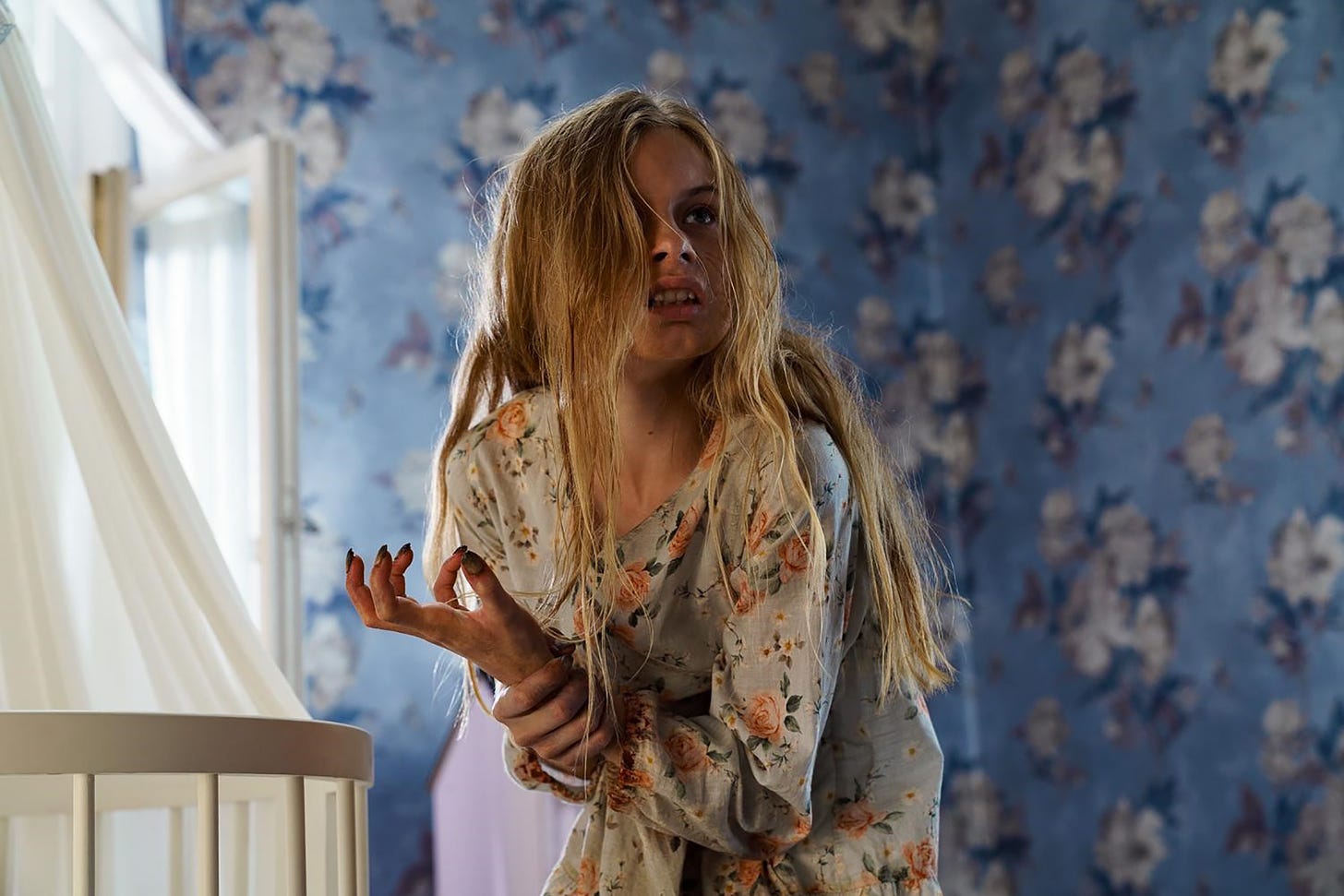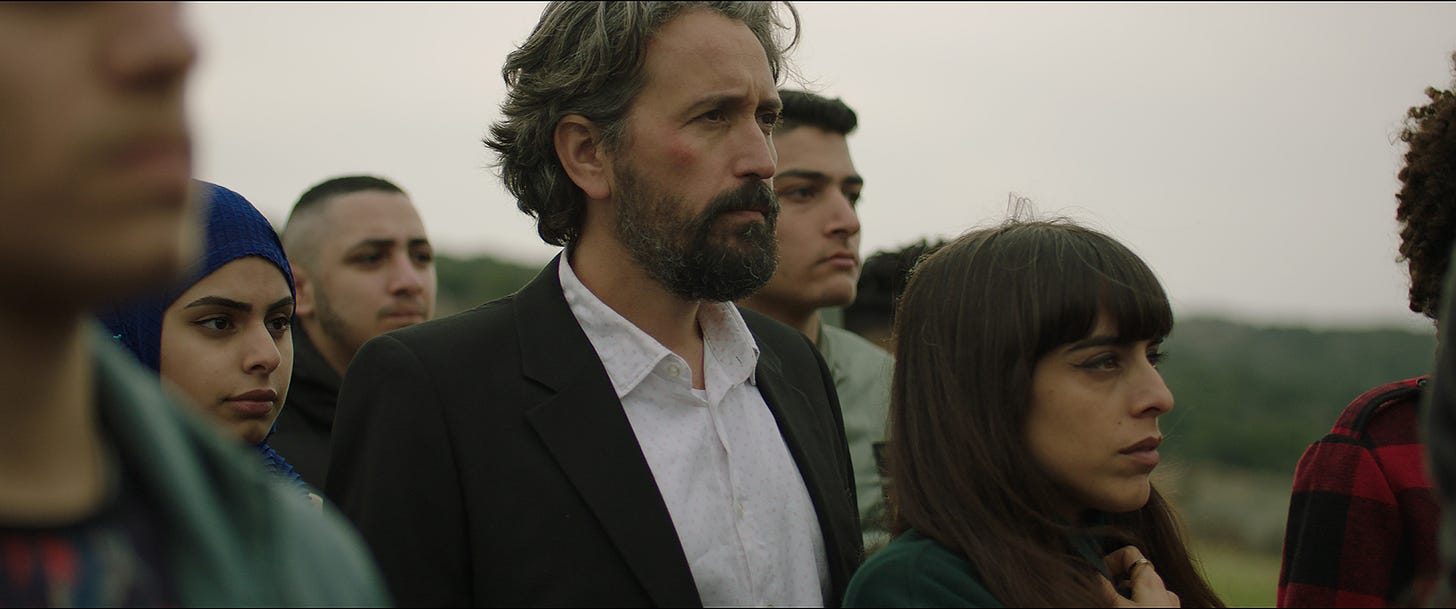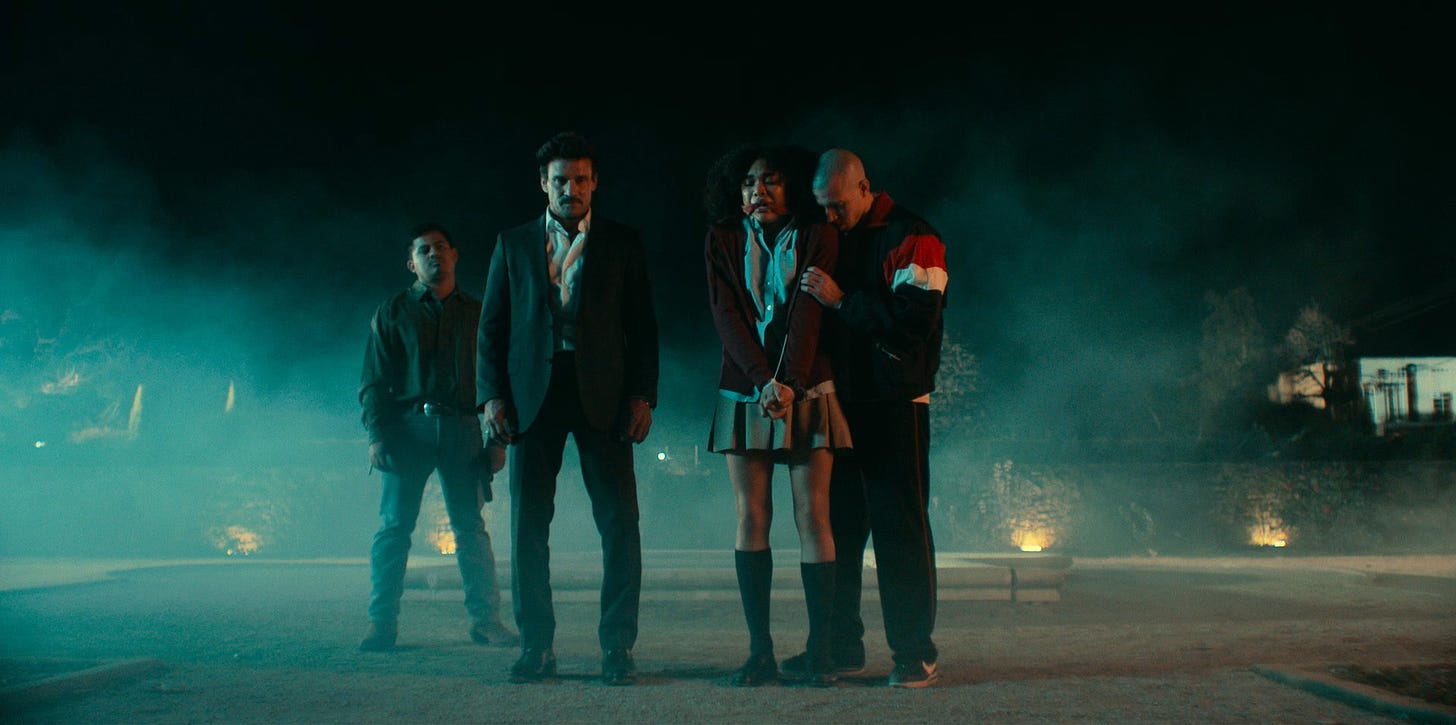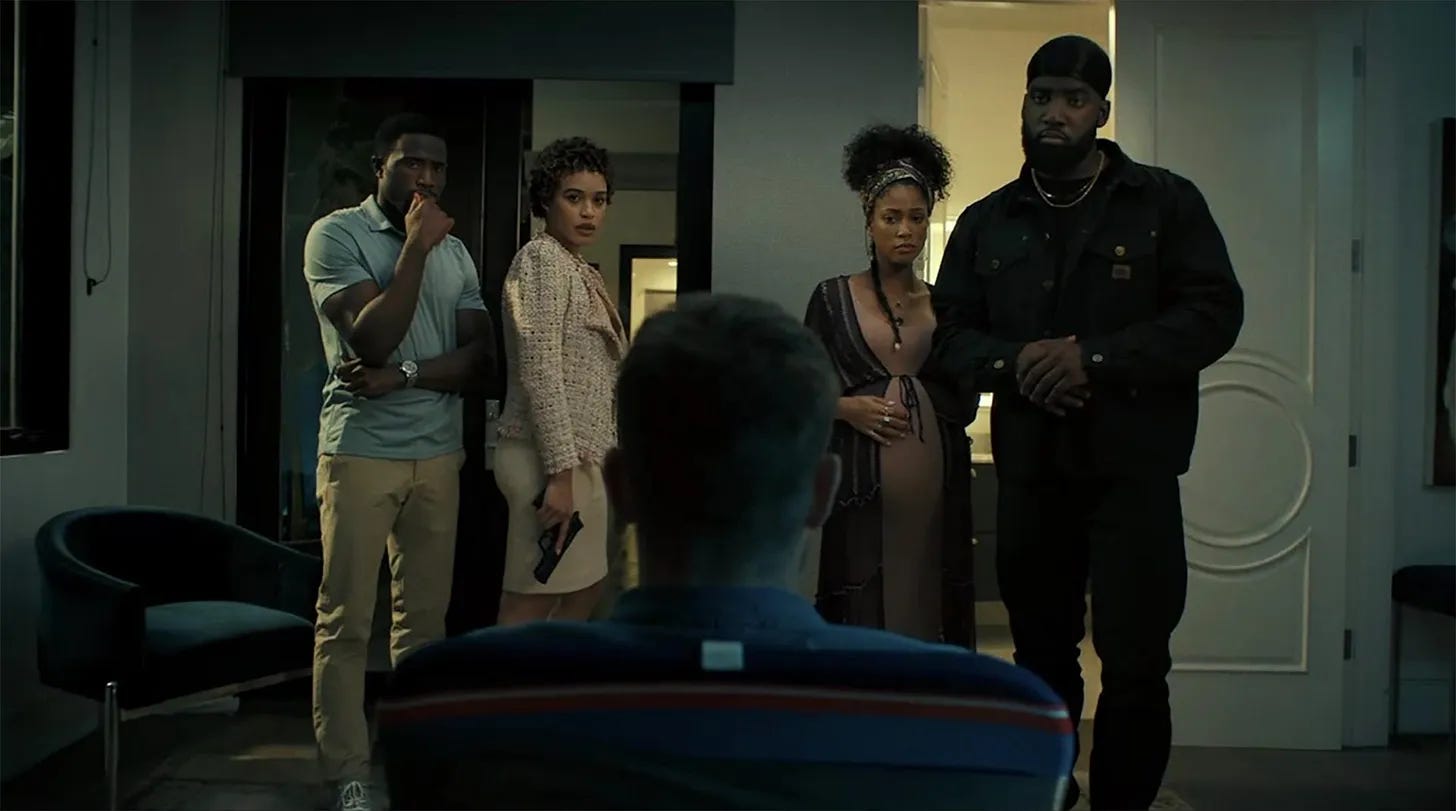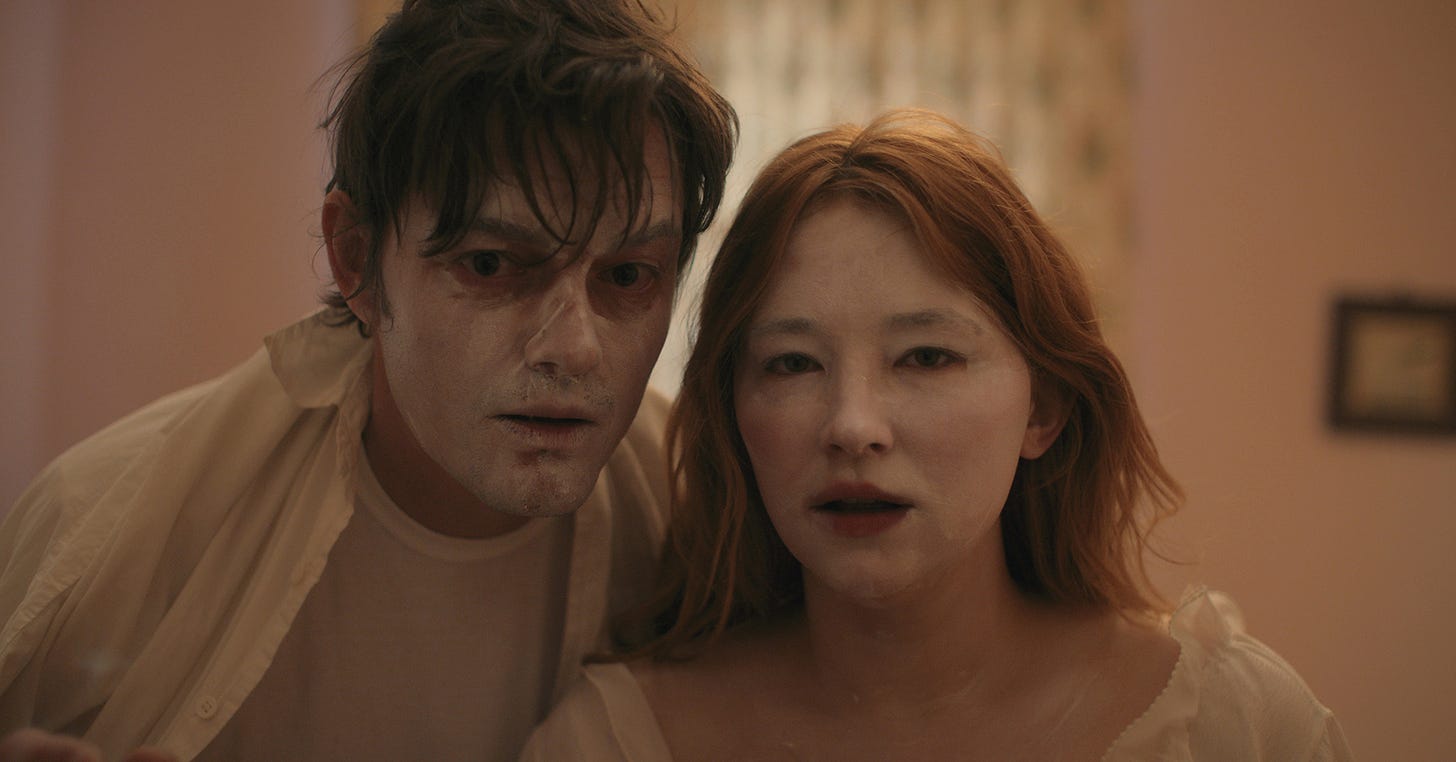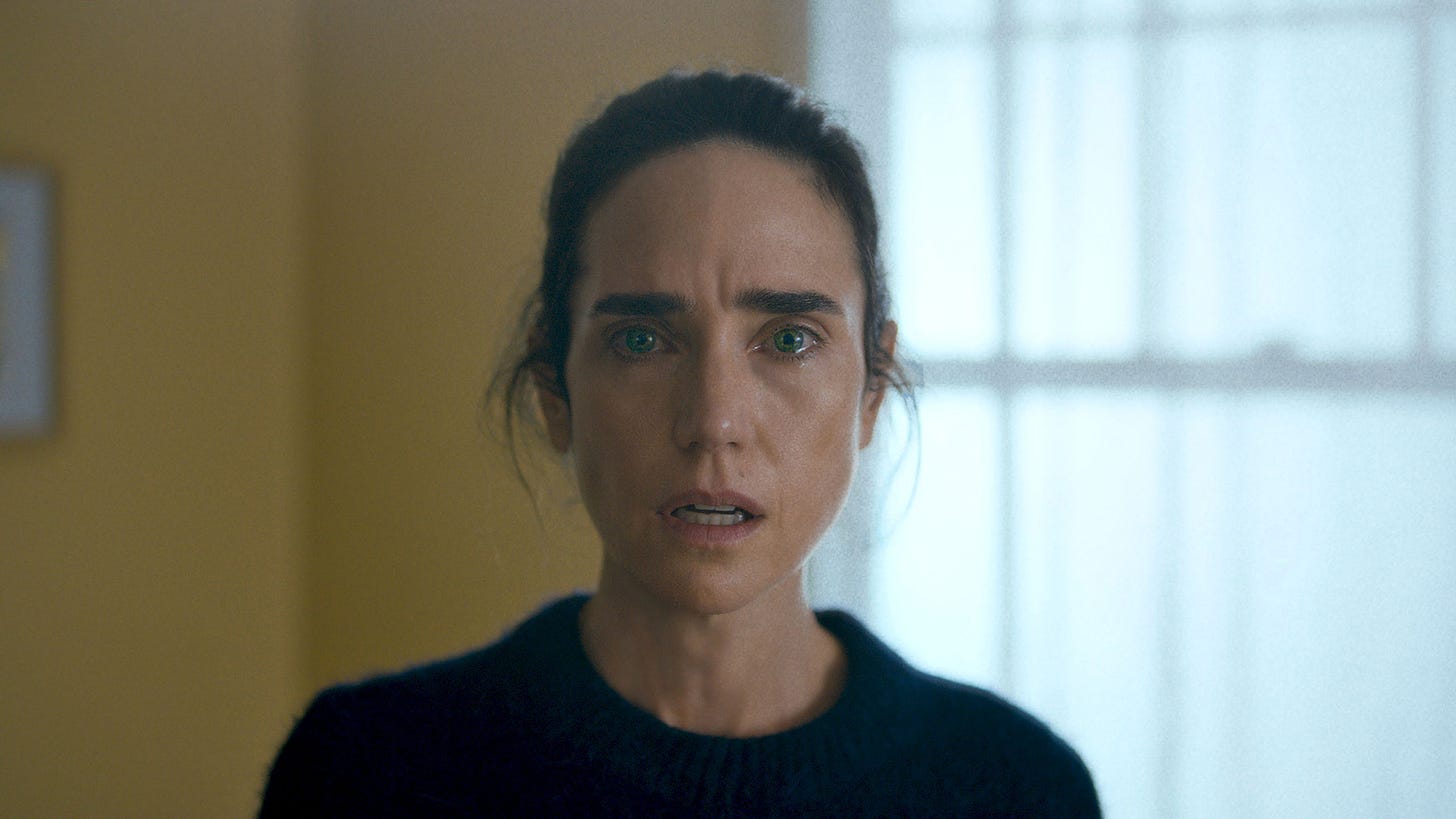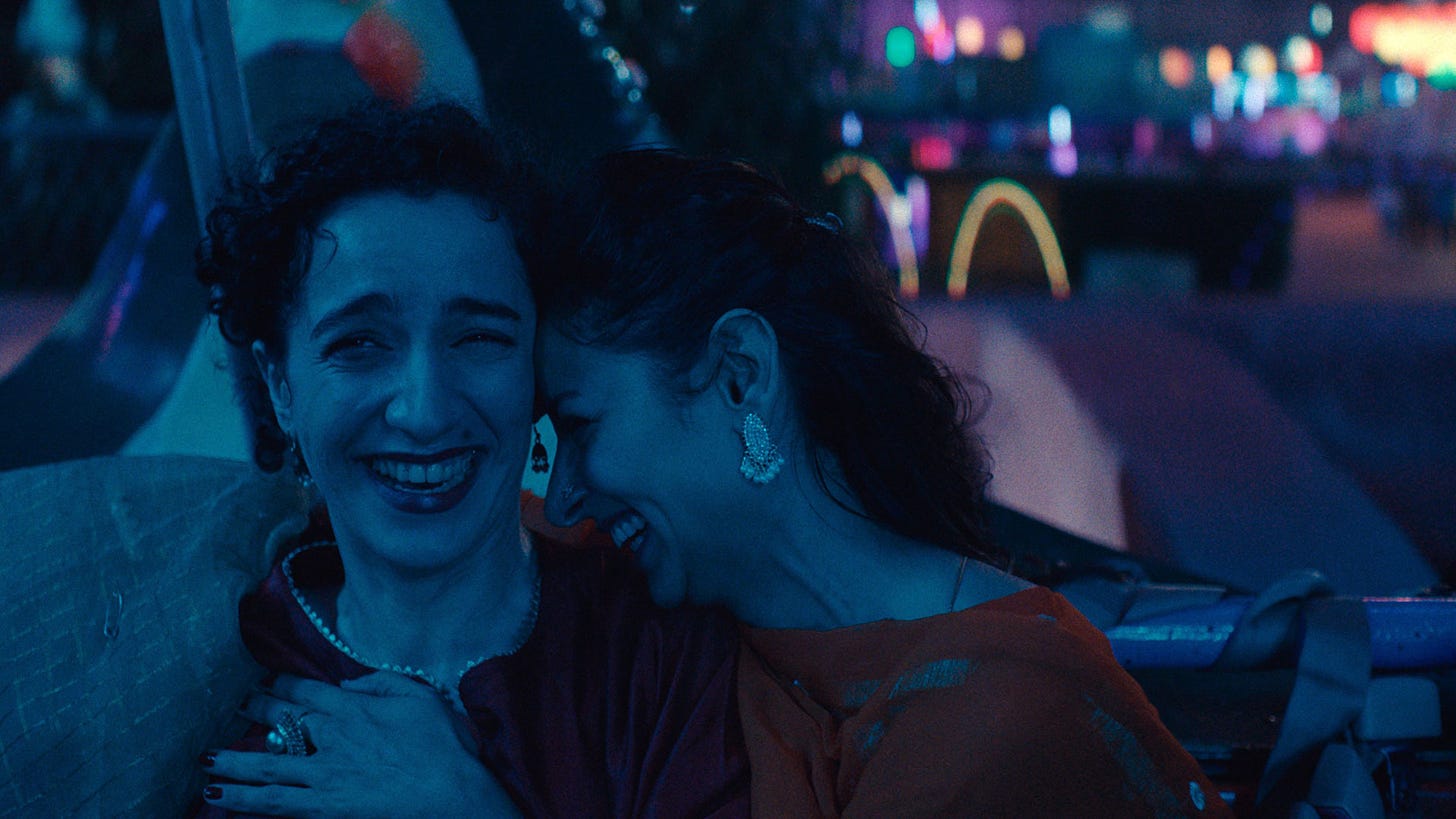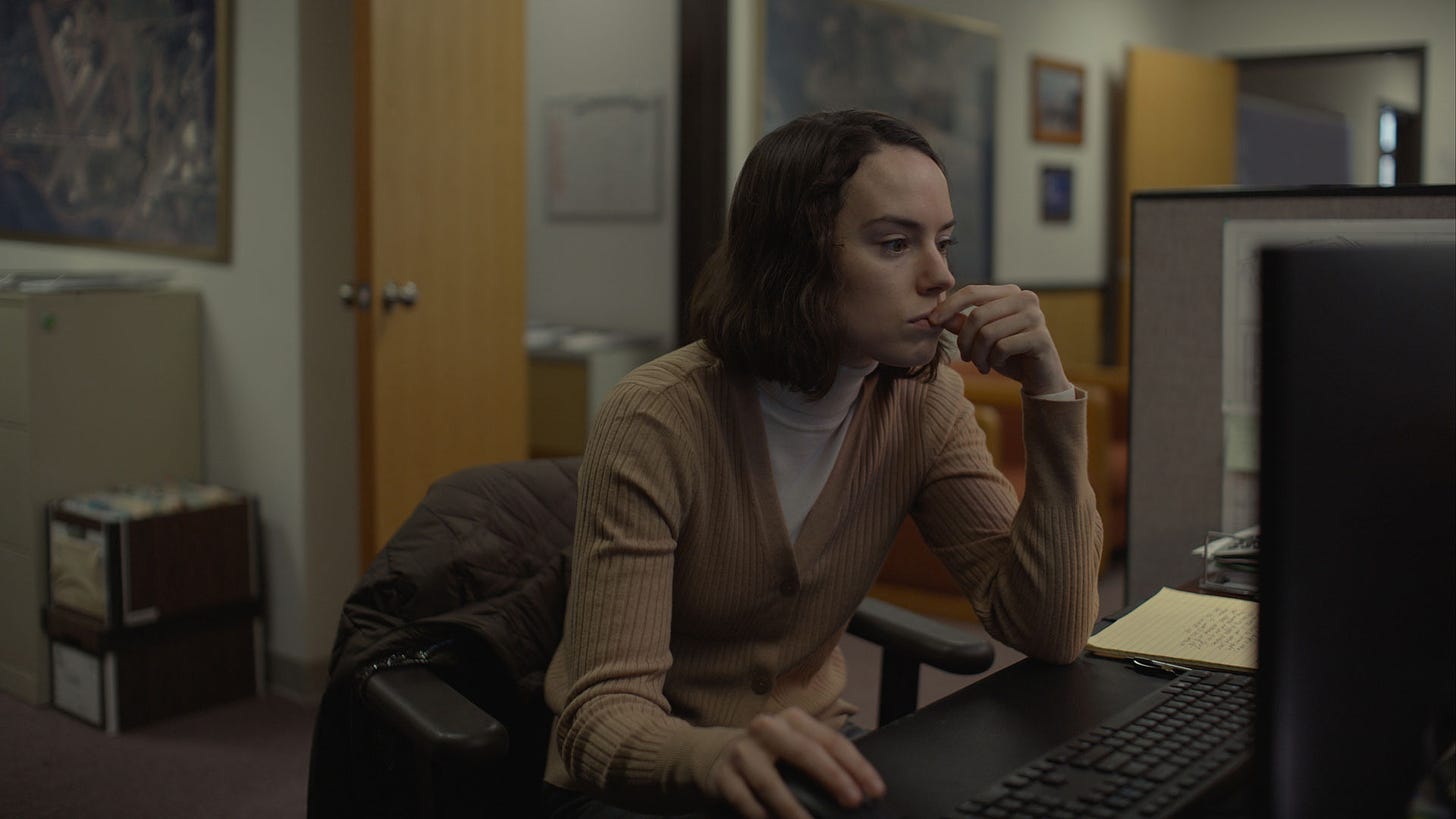The groundhog declared that winter continues yesterday and a single-digit, windy weekend arrived in tow. So, it must be right. We’re all Stephen Tobolowsky falling to ground after Bill Murray clocks him here in Buffalo.
Perfect time to warm up by the TV for a movie. An old favorite or a newly minted Oscar nominee. Just be wary what you choose and check those ratings since Netflix doesn’t seem to believe you will. Why else would they decide to not include BLONDE in their “Oscars Collection” despite Ana de Armas’ nod? Someone in the UK told me it’s included in theirs, so I guess we can chalk it up to American Puritanism and Netflix not wanting to field a bevy of complaints from “personal responsibility” conservatives choosing to blame them for the indecency instead of admitting they were too lazy to look and see what it was they hit play on.
And for those willing to venture out in the cold, WOMEN TALKING has finally opened Buffalo. I didn’t personally get the chance to watch on the big screen (and it was one of my favorite films of 2022 anyway), but it’s there for those who’d rather that be their first experience with the Best Picture nominee.
What I Watched:
THE AMAZING MAURICE
(now in theaters)
I’m not versed in Terry Pratchet’s DISCWORLD, so I cannot speak on Toby Genkel’s film THE AMAZING MAURICE (adapted by Terry Rossio from Pratchet’s 2001 Carnegie Medal-winning, twenty-eighth entry to the series) in the context of that over-arching legacy. All I can do is talk about how this standalone chapter in cinematic form provides entertainment for the whole family with a mix of child-targeted humor and adult-oriented wit. It is a satire of the fairy tale genre as much as a fairy tale in and of itself after all. Explaining that fact by way of multiple narrators and a framing device can cause some unnecessary confusion at times (since Malicia, played by Emilia Clarke, is ostensibly narrating it twice all by herself along with the titular cat), but that chaotic nature does add to the charm.
Because it’s ultimately both hers (the daughter of the mayor of a town in the midst of a famine due to a rat infestation stealing food despite a rat-catcher—David Thewlis’ Boss Man—assuring that the rats have been caught) and Maurice’s (Hugh Laurie) tale to tell. Her way is through genre tropes, comparing the beats of reality to those of a book in her collection about a talking rabbit living in harmony with humans while also living that reality as though it must follow those beats exactly (no matter how far-fetched doing so would prove) because one must create their own story so as not to become part of someone else’s. His way is through motivations, appealing to the audience’s good nature to understand that his being a cat (despite his speech and intelligence) allows him some latitude for a penchant to being selfishly aloof.
Connecting them together is Keith (Himesh Patel) and a band of talking rats (including David Tennant’s Dangerous Beans, Gemma Arterton’s Peaches, and Ariyon Bakare’s Darktan). Maurice cons his friends into schemes to fleece money from unsuspecting villagers that will one day pay for their retirement in a fantasy land of harmony. They do so by pretending the rats are vermin to be expunged and Keith a pied piper willing to do so for a fee. It just so happens that Malicia’s town is next, so they arrive to put on their show and find a darkness awaits. Her overactive imagination and encyclopedic knowledge of fairy tale conventions simultaneously endears her to their plight and helps make it more dangerous. Dueling rescue plans unfold as well as a subplot about a “rat king” created by mankind’s vicious nature; the inclusion of the real, unsanitized Pied Piper (Rob Brydon); and even Death (Peter Serafinowicz) himself.
It’s a fast-paced adventure bouncing back and forth between vantage points (sometimes Maurice leads, sometimes Malicia, Darktan, or Dangerous Beans depending on how many forks are going at one time) and devices (narrator Malicia and Maurice taking control as outsider and fourth wall-breaking commentator respectively) to keep the jokes loose and the danger light. The latter is key for young audiences since scenes get murky (like one at an underground dog fighting ring with bettors guessing how long their canine champions need to murder five rats). Lessening that violent intent helps the overall message about sacrifice and being better than preconceptions foisted upon you at birth to shoulder its equally heavy dramatic weight. The film stumbles at times and is definitely convoluted, but it also just plain works. Time to read the novel.
- 6/10
THE CIVIL DEAD
(now in limited release; hits VOD on 2/17)
Begun as an idea to simply shoot a small-scale film during the pandemic in a way where it would mostly just be him and his friend/co-writer Whitmer Thomas, Clay Tatum’s THE CIVIL DEAD may never have become anything more without an old friend (Mike Marasco) calling out-of-the-blue to pitch financing his next project. A budget of thirty thousand dollars was all he’d need to get this concept off the ground—especially after the additional thought of making Whit into a ghost only Clay can see. There would be a need for more actors to help flesh out a narrative, but the conceit ensured the majority could work as a two-hander between friends trying to figure out an impossible situation.
Because this isn’t a normal scenario. Even if you believe in ghosts and the notion of “hauntings,” we’re talking about a supernatural trope that deals in horror, jump scares, and the macabre. To therefore come at it from a place of civility and kinship proves an intriguing wrinkle in and of itself. Whit doesn’t want to be a burden. He’s just ecstatic to have found someone who can see him let alone have that someone be a person he knows. Whit has been roaming the streets of Los Angeles as an invisible specter with nothing to do and nowhere to go. Since he can’t walk through walls or open doors, he can’t really go anywhere. So, when Clay crosses his path and acts like nothing is amiss, why wouldn’t Whit take the opportunity to go somewhere new?
And therein lies the real reversal: Clay isn’t afraid of Whit. Not in the usual sense. It’s actually Whit who’s afraid of Clay, knowing that this dynamic probably can’t/won’t last forever. What would Clay’s wife say if he told her he invited a ghost she can’t see to live with them? What happens when Clay decides he’s had enough and Whit loses the only human being who knows he exists? The uncertainty and frustration leads Whit to lose his cool and cause unexplainable events that do him no help on the “friendly ghost” front. The plot’s comedy soon exposes a tense underbelly of anticipation as far as Whit finally going too far or Clay pushing back to a point of no return.
With a memorable supporting turn from Robert Longstreet and a number of unsuspecting victims, Tatum and Thomas take us on an entertaining ride through the selfish potential born out of having an invisible ally. It can feel a bit long at times, but I don’t think the filmmakers ever overextend the joke. It helps that they acknowledge the dark places inherent to the conceit and the fact that their main character Clay is hardly a trustworthy guy who’s able to look out for anybody but himself (wife included). So, like so many horror-adjacent films in recent years, THE CIVIL DEAD’s monster isn’t the creature hiding in the shadows. It’s the living, breathing, regular Joe who’s calculating the point where that which can be gained no longer offsets that which can be lost.
- 6/10
HATCHING [Pahanhautoja]
(streaming on Hulu and on VOD/Digital HD)
Hanna Bergholm’s HATCHING almost lost me at the end. What had been a captivating look at the psychological damage wrought by a narcissistic parent made flesh suddenly takes a turn wherein the real person at fault appeared to be getting away with their incessant abuse. I thought Ilja Rautsi’s script (from Bergholm’s story) was falling prey to the same flawed logic so much Hollywood fare does as far as sympathizing with the aggressor simply because we’ve been culturally hardwired to excuse troubling parenting as the cost of doing business rather than an inexcusable form of violence (see LADY BIRD for a recent example of the opposite). Thankfully, however, Bergholm and company know what they’re doing. They intentionally lead us towards that potential to deliver a punishment worse than I could have assumed.
Because this mother (Sophia Heikkilä) deserves punishment. There’s a difference between being a “woman who knows what she wants” and a cruelly vain monster terrorizing those who love her until they willingly take a subservient role to her whims. It goes beyond just pushing her young daughter Tinja (Siiri Solalinna) into a soul-crushing emotional prison because she wasn’t able to live out her own fantasies when she was her age. It’s also posing her hollow shell of a husband (Jani Volanen) and spoiled brat of a son (Oiva Ollila) like dolls into a perfectly fabricated nuclear family for her online followers. And it’s about falling in love with a younger widower (Reino Nordin’s Tero) and forcing everyone to let her hijack his life too without facing any consequences since loving someone means letting them be happy—even at your own expense.
It’s no surprise then that Tinja would snap. The pressure of gymnastics. Keeping her mother’s affair secret. Always pretending to smile when she feels nothing but rage from constantly having her own desires silenced. Why not figuratively put all that pent-up hostility and torment into the raven egg she finds in the forest to watch it grow with the salt of her tears? What hatches is a grotesque human-sized bird with unnatural characteristics that ensure we know exactly what’s happening next. Tethered psychically as two halves of one whole, it becomes difficult to know whether what we see is real or a metaphorical manifestation of split personalities: victim and protector vying to survive an onslaught of horror no child should ever have to bear as her parents continue to pretend nothing is amiss.
The creature effects are a lot of fun and the twists and turns as far as characters like Tero or Tinja’s new friend Reeta (Ida Määttänen) are concerned really keep the narrative fresh and ripe for graphic gore. They also allow Tinja’s all too familiar victimization to have points of comparison and contrast. To see Reeta’s pure joy is to know that Tinja’s happiness is simply a mirror unto her mother to avoid more punishment. And Tero’s genuine worry and attempts to listen to Tinja rather than dismiss shows everything her mother and father aren’t with little more than an empathetic look. So, while the horror aspects are a nice touch to keep audiences interested in blood happy, HATCHING’s true success is its authentic depiction of the sort of childhood trauma too many laugh off as growing pains instead of a destruction of innocence.
- 8/10
LET IT BE MORNING [Vayehi Boker]
(now in limited release)
You can’t read the synopsis for Israeli filmmaker Eran Kolirin’s LET IT BE MORNING (adapted from Palestinian author Sayed Kashua’s novel) without letting an opinion form about the ongoing conflict and occupation. It calls the setting “an Arab village in Israel”—a description that could very well be objectively true and yet unreliable considering how aggressively violent Israel has been when it comes to illegally expanding its borders. The narrative literally depicts the construction of a wall and the impact that the resulting roadblock to facilitate it has on the Arab population being physically separated from their own country. Because if this truly is “an Arab village in Israel,” then those Arabs are Israeli.
Despite this fact, and his high-paying job in Jerusalem, Sami (Alex Bakri) is forbidden from crossing the newly formed border. He left the city to return home for his younger brother’s (Samer Bisharat’s Aziz) wedding only to find himself stranded when attempting to drive back with his wife (Juna Suleiman’s Mira) and their son. Forced to return to his parents and wait out this indefinite incarceration, he’s also forced to open his eyes to just how untenable things have become. You have gangsters calling themselves council members to lord over Palestinians with Israeli permission. There’s a witch-hunt for lower class Palestinians further pitting Arabs against Arabs to their occupiers’ benefit. And, of course, the growing sense of futility where “peace” is concerned.
This comedic look at that futility consists of contradictions and hypocrisy. Everyone in the village holds Sami to a lofty standard as a success despite him being on the bottom rung of a world that refuses to fully accept him enough to help him when under siege (the roadblock brings a power outage and loss of cell signal, so his inability to call work means getting fired isn’t a far-fetched assumption). Yet he embraces it like a badge of honor anyway, looking down upon old friends like Abed (Ehab Salami) for remaining stuck. It’s why the refusal of Sami’s attempt to help the “illegals” (non-Israeli Palestinians) working construction on his father’s property feels so potent. These laborers doesn’t need one jailer to help escape another. Prison is prison.
There are many powerful moments like that from Sami’s mother (Izabel Ramadan) stealing every scene with nothing more than a wry smile and shrug to Mira reminding her husband that he should be sorry for what he didn’t do rather than what he did. The latter is a theme that runs throughout: a young Israeli guard leaning on his innocence and rank to justify his complicity, Sami’s father (Salin Daw) perpetually lamenting how the village has let cowardice take hold after his generation stormed blockades as martyrs, and even young Aziz’s fear of being a husband causing him to avoid his wife’s bed like everyone else avoids acknowledging their own shortcomings by blaming anyone but themselves.
Could it be more biting? Sure. A bit more anger would have done it well, but there’s a fine line being toed that makes that difficult. While tasking Kolirin with the adaptation gives the project legitimacy, it also demands a certain level of whitewashing. Israel chose this film as their Oscar submission last year, so that should tell you all you need to know as far as whether the message was hard enough to move the dial. Did they pick it solely because they thought it was the best production to come out of their country or because its “controversial nature” would help them appear self-critical and progressive? I’ll just say that I doubt they even consider it if it really went for the jugular. You still cannot deny its effectiveness as is, though—especially if that restraint helps earn the eyeballs of those who need to watch it.
- 7/10
LITTLE DIXIE
(now in limited release and on VOD/Digital HD)
If you decide to run for office and hire a quality fixer to put you over the top, maybe avoid telling them that you don’t want to know just how shady their behind-the-scenes string pulling is. Governor Jeffs (Eric Dane) learns this lesson the hard way when his attempt to look strong on crime in the aftermath of putting a Mexican drug cartel leader’s brother to death ends up guaranteeing his own demise. It’s not like Billie (Annabeth Gish) didn’t warn him. She simply didn’t quite elaborate enough to force him into listening. Some things unfortunately go beyond the extensive scope of their friend and hired muscle Doc Alexander’s (Frank Grillo) undeniable badassery.
That doesn’t mean John Swab’s LITTLE DIXIE isn’t still all about Doc proving scope is an illusion once events are made personal. The moment Cuco Prado (Beau Knapp) takes his daughter (Sofia Bryant’s Nell) hostage amidst a revenge rampage, Doc is all-in on going above and beyond no matter the consequences to get her back. It leads to some nice shoot-em-up sequences and a mostly welcome sense of pragmatic understanding when death arrives between people in the game who accepted the risk of that participation long ago (with Thomas Dekker lending some comedy by conversely pleading for his life). Add some eccentricities like Doc talking to a decapitated head in a bowling bag for a third of the runtime and it’s easy lose yourself to the film’s darkly entertaining sensibilities.
Because let’s be honest. You chose this particular genre flick with a desire to watch Frank Grillo casually take out a high number of nameless antagonists while pursuing mostly justified (if immoral) acts of violence. It’s what he does and what Swab and company deliver. Some moments are maybe too over-the-top, but that’s how legends are made and why Nell never wavers in her belief that she will be saved. Her mom can divorce Doc for drinking away his military-based PTSD and his penchant for the gray areas of life can make it so his W-9 bears no resemblance to his actual day-to-day activities, but he’ll never stop being her idol and biggest champion. The extensive collateral damage must simply embrace its sacrifice to that cause.
- 6/10
A LOT OF NOTHING
(now in limited release and on VOD)
You can’t have an open, rational conversation if you aren’t willing to acknowledge that you might be wrong. It’s difficult to do so, though, when the call to have that kind of conversation is often born from a position of heavy emotions and an unwavering certainty that said position is the rational one. This is the fallibility of mankind and the catalyst for so much of the hate that seems to run rampant within our respective echo chambers. Debate is dead. Comprehension is tainted. Indoctrination is king. We hear what we want to hear and let fear rule our impulsive responses. We’re weak and angry and self-righteous and, perhaps most of all, deluded.
Director Mo McRae and co-writer Sarah Kelly Kaplan push the futility that should result from such truths to the background of their film A LOT OF NOTHING so that the absurdity of the resulting manic desire to pretend the opposite takes centerstage. We see it in the opening scene with Vanessa (Cleopatra Coleman) and James (Y'lan Noel) watching TV in their wealthy suburban neighborhood home to discover yet another young unarmed boy had been shot by the police. And more than just another tragedy to feel in their bones as a Black couple in America, the culprit was the man who lives next door (Justin Hartley’s Brian)—a man who had already used the phrase “you people” with them over a garbage tote dispute.
What would generally be a sobering exchange of horror and sadness quickly turns to a rousing call to arms instead. Rather than get angry in the abstract or at each other (James is so far removed from a past littered with the bodies of his friends that his newfound affluent corporate lawyer personality takes over to tell Vanessa they should “wait until all the facts come out”), they keep the scotch pouring as they egg each other on to burn the world and do something. First it’s writing a social media post before remembering their white bosses lurk in the likes. Next it’s a confrontation to walk over and say something to Brian’s face. Then it’s a matter of getting their gun to show him what it’s like to feel powerless. It’s a one-shot rapid devolution of sanity that seems right in context with its insane circumstances.
You can say the same about the entire film as McRae and Kaplan throw every ideological and racial contrast at the screen to get their audience to laugh and think in equal measure. They systematically separate everyone in the process too, often potently doing so right after initially aligning them. Because while James and Vanessa must both deal with being Black in mostly white spaces, she is also a woman—in the same position as a woman in his office that he inherently demeans to steal whatever sense of control he can from the men dehumanizing him. Parenthood. Economics. Spirituality. Gender roles. Mental health. Social politics. It’s all on the table once violence is wielded to force an open and rational conversation that can never be either.
It’s an entertaining if overstuffed ride that pulls no punches. It leans so hard into stereotypes that it’s easy to question some of the choices (especially when turning the tables as far as assumptions towards Brian go) before realizing that flipping everything is necessary to avoid being labeled the irrational person holding the gun. Paranoia and deception therefore rule the day as each party (the trio is eventually joined by James’ brother, Shamier Anderson’s Jamal, and pregnant sister-in-law, Lex Scott Davis’ Candy) seeks to push matters towards a place where they each have an advantage. Mistrust ultimately prevails until escape proves impossible. Because these conversations only seem to ever end worse than they’ve begun since the only person we truly listen to today is ourselves.
- 7/10
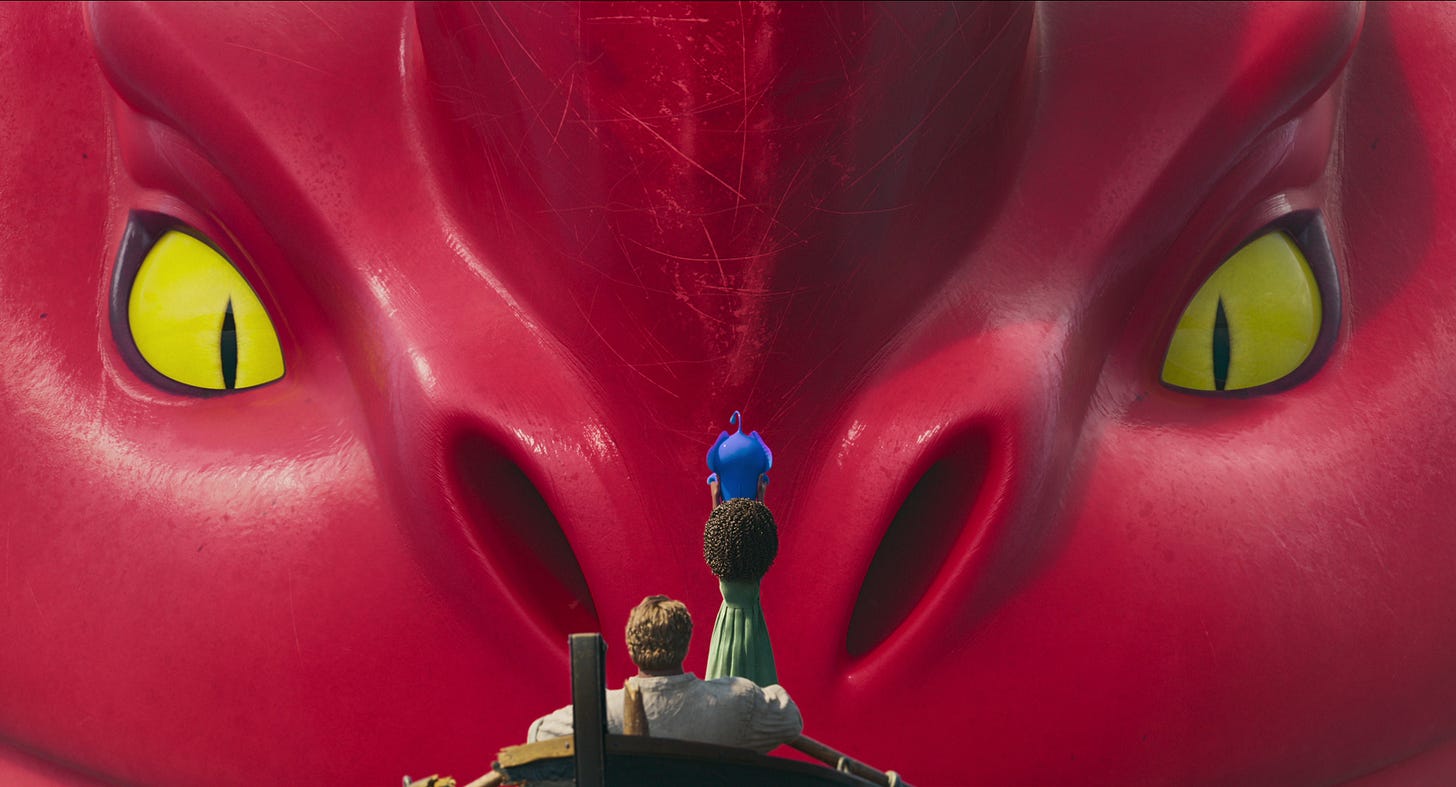
THE SEA BEAST
(streaming on Netflix)
If there’s one thing everyone knows, it’s that beasts kill humans. This is why the king and queen have commissioned monster hunters for centuries to sail the unknown seas and take down whatever creatures they find before they can do the same to us. The men and women who accomplish this feat—whether surviving or not—become heroes for whom books are written to immortalize their exploits. Those are the stories young Maisie (Zaris-Angel Hator) has clung to ever since her parents were murdered on one such expedition and why she wants nothing more than to follow in their footsteps aboard the famed Captain Crow’s (Jared Harris) vessel the Inevitable alongside the legendary Jacob Holland (Karl Urban).
Chris Williams’ (co-written by Nell Benjamin) THE SEA BEAST starts as a pirate romp as a result. We see the wreckage of these water wars of attrition via flashback and the high octane swashbuckling action of a present-day excursion into the mysterious Dregmorr. And with stunning animation, an upbeat score, and an exciting cast of eccentrics led by First Mate Sarah Sharpe (Marianne Jean-Baptiste), that would be enough. Like with HOW TO TRAIN YOUR DRAGON, however, the appeal of also supplying a worthy lesson about the ways in which we treat nature and impulsively act with fear soon takes over. Because who remembers a sea beast actually attacking a town in the past? When has there ever been a battle outside of an arena humans voluntarily entered for their own pursuit of violence?
Leave it to Maisie’s youth to allow her to have the wherewithal to keep asking questions when the adults no longer can. Because we can’t necessarily blame Crow or Jacob for their beliefs when they were indoctrinated at birth and since scarred by the carnage wrought by their jobs. It doesn’t therefore matter to them who started what. They are paid to protect home by traveling the ocean and killing monsters. Whether it’s them looking for that fight and the beasts defending themselves in response doesn’t matter once the blood begins to spill. Only Maisie has the perspective to take a moment and step back. And only someone with Jacob’s stature can platform what she discovers in a way that lets it be heard.
That latter fact won’t be an easy one to bring to fruition, though. Not when all Jacob has ever known is the opposite. So, when “Red” (what Maisie calls the most fearsome of these beasts) inexplicably saves him, it’s still not enough. Luckily, that salvation comes at the cost of his transportation and his proximity to home, so he’ll have about an hour of runtime to soften to the idea. A three-day journey upon its back with Maisie’s unyielding optimism and empathy can change even the most hardened mind—and none are more stubborn than Crow when vengeance has his temper flaring. It becomes a surprisingly emotional journey pitting duty against justice and memory against doctrine to find out that being a hero doesn’t automatically mean you’re right. Oh, and abolish the monarchy too.
- 7/10
SHE IS LOVE
(now in limited release and on VOD/Digital HD)
It shouldn’t surprise you to find a credit at the end of Jamie Adams’ SHE IS LOVE stating that “additional material” was provided by the cast. This is a mostly plotless drama that unwittingly pits two ex-spouses together for the first time in ten years to examine what such a reunion might bring. The assumption is that Adams let Haley Bennett and Sam Riley in on the history their Patricia and Idris shared before allowing them to scratch away at the awkwardness of finding themselves face-to-face with the emotional damage wrought. How do they become more comfortable? More vulnerable? Perhaps even crueler? And how will they react when coming out the other end of the catharsis?
This won’t be a film for everyone as a result. It meanders, turns a lot of focus towards Idris’ current girlfriend (Marisa Abela’s Louise) despite her never feeling like more than an obstacle for him to cling onto or avoid, and ultimately finds itself utilizing a crosscut technique that throws linear time away to supply moments that are as beautiful as they are incomplete. You either get on that wavelength to wade through the alcohol-infused memories sparked by two wonderful lead performances or you sit and wonder whether there will ever be a point. Can two troubled souls nostalgic for parts of who they were while vehemently uninterested in others that are finding their footing to let go of the sadness and rage that’s filled the void of their respective absences be the point?
I’d argue it can because there’s a lot of meat to the bones of these performances regardless of whether there’s anything else. Would it have been better as a short film without the Louise stuff taking focus away for little payoff (at least that I can see)? Probably. SHE IS LOVE is never better than when past and present collide to show us everything Patricia and Idris have learned during their time apart is perhaps the result of suppressing who they were together and who they are at their core. That’s not to say they didn’t need to “grow up” and put such things behind them or that they shouldn’t allow themselves to revisit such selfish actions and desires now. It’s simply to say we are all complicated animals built by our life experiences. Sometimes we grow out of the past and sometimes we grow to realize how to better accept its impact.
- 7/10
SUNDANCE 2023
ALL DIRT ROADS TASTE OF SALT
U.S. DRAMATIC COMPETITION
If there’s a lead character in Raven Jackson’s visually poetic ensemble ALL DIRT ROADS TASTE OF SALT spanning multiple decades while depicting four generations of a Mississippi family, it’s Mack (played by Kaylee Nicole Johnson in adolescence and Charleen McClure in adulthood). She’s our entry point into its world of memory—daughter to Isaiah (Chris Chalk) and Evelyn (Sheila Atim), sister to Josie (played by Jayah Henry in adolescence and Moses Ingram in adulthood), and granddaughter to Betty (Jannie Hampton). She’s whose perspective we take as our own to watch as time folds in upon itself to tell a story connected by emotion and the senses (Jackson and cinematographer Jomo Fray intentionally labeled these thematic transitions as “slant rhymes”) of tragedy, uncertainty, and hope.
We therefore move from a teenage Mack flirting with Wood (Reginald Helms Jr.) upon one of the many dirt roads traveled to young Josie teaching a young Mack how to practice kissing with her hand. Then we’re suddenly fast-forwarded to adulthood for a reunion between Mack and Wood, years since their last meeting, that holds all the love we can infer from the prior romantic moments as well as the pain of that which we’ve yet to witness. Jackson will bring us there soon as new life ultimately mirrors unfathomable loss—one soul replaced by another with an unforeseen complexity pushed even further so that its impact can prove as powerful to the audience as it is to the characters on-screen.
You cannot watch the film without thinking of Terrence Malick. Jackson mentions DAYS OF HEAVEN as an inspiration, but I kept thinking about THE TREE OF LIFE due to the gorgeously rendered vignettes of otherwise mundane familial keepsakes. Young Mack sitting on the floor in awe of her mother and father dancing at a party. A prolonged close-up of Betty’s hands as she speaks with her grandchildren about earth and water and mankind’s origins. The tear-streaked embrace between Mack and Wood that exorcises the demons of regret and longing to remind them that no amount of distance can truly sever the bond their spirits share. Most of these scenes are wordless. Some are accompanied by ambient noise like rains drops, others with song.
To me it feels like how I’d imagine one’s life flashing before their eyes would unfold. Long scenes and short scenes cross-cut together, bridging the gap between life and death or love and loss with either a deft smoothness or jarringly aural snap to attention. It’s like Mack’s explanation of water to a young Lily—how it has neither a beginning nor an end. It recycles through its numerous stages just like humans do with the dirt beneath their feet, each patch of land or blade of grass holding the essence of what came before much like we do our ancestors. We keep their love and light within us. We’re forever guided by their words and actions. And we’re bound to their legacy even if our place within it has been shifted from one hand to the next. To have that truth told with such honest, heartfelt devotion is a balm for the soul.
- 8/10
BAD BEHAVIOUR
WORLD CINEMA DRAMATIC COMPETITION
Lucy (Jennifer Connelly) is desperate for release. From her past traumas, present flaws, and future mortality. Lost in this sense of insufficiency (her mother committed suicide, her husband divorced her, her daughter barely calls and never visits), she hopes (despite his mantra being to “never give into hope”) that spiritualist Elon Bello (Ben Whishaw) will be able to unlock the pain and suffering that’s bottled up inside. It isn’t long, however, before Lucy realizes just how silly that fantasy was after experiencing his “enlightened” theatrics first-hand and recognizing how the other attendees of the retreat were so quick to blindly follow his vague fortune cookie wisdom as though anything being taught possessed any substance beyond the usual circle jerk of regurgitated platitudes.
Because of that, the first half of Alice Englert’s BAD BEHAVIOUR can start to feel interminable. We see that Lucy understands the sham of it all just like we do. So why must we watch them go through as many exercises as they do—all while cutting to her daughter (Englert’s Dylan) performing stunts on a New Zealand film set—only to expose the fraudulent nature of the whole that isn’t being hidden at all? I couldn’t even pretend to think of an answer for a good chunk of its circuitous motions. But then Lucy starts to open up regardless of the charade. She embraces the forum to speak from the heart even as everyone else speaks to have Elon pat them on the back for a job well done. This experience is excruciating for us because it is excruciating for Lucy too.
That’s kind of the point of the film. Mother and daughter wielding violence and sex respectively to find control amidst the scars of childhoods gone awry thanks to flawed mothers who couldn’t give them what they needed or deserved. All the critics dismissing the film as a shallow look into “mommy issues” aren’t necessarily wrong about the subject (good on Jane Campion for agreeing to cameo since she’s Englert’s own mother), but I do think they are about the vehicle. I don’t think it’s shallow at all. The filmmaking is imperfect with the pacing leaving a lot to be desired, but there’s some real potent stuff happening beneath the surface—especially via Connelly’s intensely emotional performance. The humor is meant to offset that heaviness, but it does sometimes undercut it.
The second half does a lot of work to overcome this truth. So too does a midpoint fracas at Dasha Nekrasova’s expense that lets Lucy and Elon’s true natures come out (what an insanely entertaining spectacle). It might be a little too late for some, but I’ll simply say that you should stick with it anyway to witness the fruits of Lucy and Dylan’s self-destruction. Englert’s script is never better than when these two characters are on-screen together with as much distrust for the other as love to push buttons that they’ve both become too tired to reflexively brush away. Have they acted poorly? Sure. Do they have reasons that probably demand professional help to process? You bet. But none of that means they’re bad people. They might just need the other to admit as much before they can admit it for themselves.
- 6/10
JOYLAND
SPOTLIGHT
You might assume the reason the Pakistani government reversed course and banned Saim Sadiq’s JOYLAND, despite the censor board certifying it (and the film ultimately becoming the country’s Oscar submission, landing on the shortlist), was solely because it depicts a romantic relationship between a man and a trans woman. The right wing campaign against its release specifically called out this detail as a focal point for why it was “against Pakistani values”, but anyone who watches the movie will understand this rhetoric was intentionally chosen to deflect from a more subtle problem: headstrong characters drowning beneath the repressive nature of a patriarchal culture that are desperate to break free.
Because this isn’t just Haider’s (Ali Junejo) story. It’s not just a look at the shy, closeted gay, youngest son of a domineering father (Salmaan Peerzada) stumbling upon a new world affording him escape from oppressive conventions. His trajectory is crucial (and perhaps ignites everything that occurs), but Sadiq and Maggie Briggs’ script delivers so much more. There’s Haider’s wife Mumtaz (Rasti Farooq), a woman promised to be able to continue her career aspirations and not simply become a mother upon marriage. There’s Haider’s sister-in-law Nucchi (Sarwat Gilani), about to give birth to her fourth child in husband Saleem’s (Sameer Sohail) quest for a son. And, of course, Biba (Alina Khan), the trans woman Haider falls in love with after taking a job as her background dancer.
Add Sania Saeed’s neighbor Fayyaz and we find ourselves watching four women of whom society treats as invisible. Women stripped of autonomy either through marriage, motherhood, or postcolonial taboo. And with them is a man whose own identity has been threatened by slurs and rumor to the point where his father quips that perhaps he isn’t up to the task of conceiving a child with a woman. The reason Haider becomes our entry point, however—beyond being the connective tissue between the others’ worlds—is a byproduct of his being a man and thus in possession of the privilege to act selfishly at the detriment of those around him. Because while he remains sympathetic, he also refuses to comprehend the damage he creates by always centering his needs first.
JOYLAND ultimately proves itself to be about complicity. The ways in which our silence allows for the systematic dismantling of another’s chance to be free. Haider finally getting a job (not that he can admit what it is) shouldn’t mean the instantaneous end to Mumtaz’s independence. Maybe it wouldn’t if he stood up for her. Fayyaz finding herself stranded at Haider and Saleem’s home because everyone was out and she offered to care for their father (she often brings him food and company in the years since her husband’s death) shouldn’t result in her being punished with house arrest due to what their community “might say” about potential behind-closed-doors indiscretions. Maybe it wouldn’t if Peerzada had her back. The last hour unfolds with an escalating series of such moments, each victim crying for help with their eyes only to be let down by someone diverting theirs to the floor.
It’s why Biba is so inspiring. She refuses to let anyone dictate who she is or what she is capable of doing. So, when she assumes she has an ally in Haider, it’s easy to fall in love. Where this love would blossom and give the middle finger to society in an agenda-driven LGBTQ romance, her unwavering agency has no problem kicking him to the curb the moment that allyship is revealed as having certain conditions here. Don’t therefore expect any happy endings. Not when each potential road towards one exists with the sort of complexity that ensures one party’s joy demands another’s compromise (or, worse, suppression). Because the moment you let doctrine decide purpose, you’ve already lost. A simple “I do” suddenly becomes a defeated “I will” until escape itself shifts from being a hopeful pursuit forward to a solemn release towards oblivion.
- 9/10
SOMETIMES I THINK ABOUT DYING
U.S. DRAMATIC COMPETITION
There’s a beautiful serenity to the moments in Rachel Lambert’s film SOMETIMES I THINK ABOUT DYING when lead character Fran (Daisy Ridley) does exactly that. Because anxiety and discomfort take over whenever she isn’t lost in those daydreams of stillness. Whether the loudly hollow conversations of coworkers or the mundanely idle small talk foisted upon her shielded and quiet wallflower, Fran is caught in a no man’s land of curious terror that often leads to her silently excusing herself so as not to feel both out-of-place and like a distraction. Her presence as an “other” keeps her separate thematically while also ensuring that she believes she’s actually sticking out.
Adapted by Stefanie Abel Horowitz (who also directed a short version) and Katy Wright-Mead from Kevin Armento’s play “Killers” (I’m fascinated by how this staid and introspective work originated on-stage since so much of its potency lies in moments devoid of dialogue), the plot seeks to pull Fran out of her subconscious ruminations on life and death by introducing a potential love interest in Robert (Dave Merheje). It’s a clandestine courtship begun on the inter-office chat app that quickly reveals itself to be a case of opposites attracting with his loquaciousness endearing and frustrating as easily as her shy introversion. He’s just moved to town and already has made friends with those serving him at the local diner and theater. Robert is everything Fran isn’t.
And yet he isn’t perfect. He, like everyone in their office, must still endure the machinations of humanity filling time and space with empty words. Lambert’s film is very deliberate with a glacial pacing that embodies this awkward atmosphere of phoniness to help us understand Fran’s isolation as well as the commonality of just how easy it is to lose years of your life to the grind of careers that promise to set you up for a prize of happiness that may never come. That’s not to say the message is to connect with people you may not like just to survive. Parvesh Cheena’s Garrett is proof of the opposite—connecting superficially with coworkers to get through the daily artificiality and maintain true joy outside its capitalist convention.
It’s also why, while cutely endearing, the Fran and Robert dynamic is perhaps the least interesting piece of the whole. The dry humor of their insecurities is entertaining enough to endure the pacing, but it’s the supporting cast like Garrett and especially Marcia DeBonis’ Carol that truly resonates. They are the ones that provide Fran examples of what her life could be while also revealing how her terror in the unknown isn’t unique. We all feel it. Some simply cope better thanks to a personality and/or past that helps them overcome the debilitating fear. Because connection isn’t a catch-all answer. Carol is proof of that (DeBonis is truly fantastic in a limited role). It supplies hope, though, and a promise that maybe life isn’t so scary after all.
- 6/10
Cinematic F-Bomb -
Sandra Bullock losing it in 28 DAYS. (Substack apparently can’t handle an embedded gif, so you’ll have to click over for a smoother experience. Or see everything at cinematicfbombs.com.)

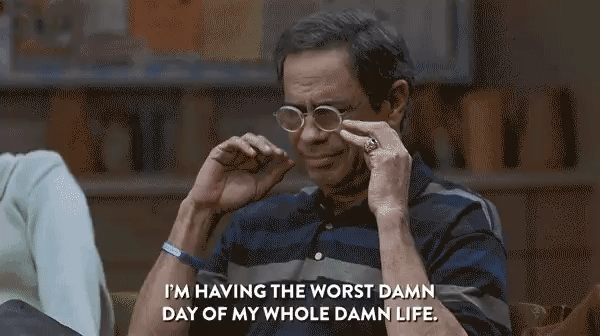
New Releases This Week:
(Review links where applicable)
Opening Buffalo-area theaters 2/3/23 -
80 FOR BRADY at Dipson Flix; AMC Maple Ridge & Market Arcade; Regal Elmwood, Transit, Galleria & Quaker Crossing
THE AMAZING MAURICE at Dipson Flix; Regal Elmwood, Transit, Galleria & Quaker Crossing
Thoughts are above.
BUTTA BOMMA at Regal Elmwood
FREEDOM'S PATH at Regal Elmwood
KNOCK AT THE CABIN at Dipson Amherst & Flix; AMC Maple Ridge & Market Arcade; Regal Elmwood, Transit, Galleria & Quaker Crossing
MICHAEL at Regal Elmwood & Transit
SWORD ART ONLINE THE MOVIE -PROGRESSIVE- SCHERZO OF DEEP NIGHT at North Park; Regal Galleria & Quaker Crossing
WOMEN TALKING at Dipson Amherst
“It may just be eight women and their minutes-taker arguing in one room for the duration, but it's the most dynamic and tense film I've seen all year. Foy is a force of nature.” - Full review at HHYS.
Streaming from 2/3/23 -
ROWDY - Freevee on 2/3
INFIESTO - Netflix on 2/3
TRUE SPIRIT - Netflix on 2/3
CASANDO A MI EX - Amazon Prime on 2/6
BILL RUSSELL: LEGEND - Netflix on 2/8
ATTACHMENT - Shudder on 2/9
“Gislason isn't wielding gimmicks as much as slowly peeling back the layers he's built upon an ancient truth those involved were too scared to confront head-on. This film grounds itself as far as how dybbuks and the like would appear in our reality.” - Full review at The Film Stage.
HARLEY QUINN: A VERY PROBLEMATIC VALENTINE’S DAY SPECIAL - HBO Max on 2/9
A WILD PATIENCE HAS TAKEN ME HERE - MUBI on 2/9
Now on VOD/Digital HD -
BABYLON (1/31)
“I have to give Chazelle credit because he goes for broke and shows little room for regret. Unfortunately, no matter how electric those first couple hours may prove, the third (yes, full third hour) can't help but drag.” Full review at HHYS.
BLOOD (1/31)
“It's an effective spin on usual genre tropes with Monaghan constantly pushing herself beyond the limits of morality to keep her boy alive. Stick with surface and you should enjoy the ride.” - Full review at HHYS.
HOUSE PARTY (1/31)
KEANE (2004) - 4K RESTORATION (1/31)
PETIT MAL (1/31)
BLACK PANTHER: WAKANDA FOREVER (2/1)
“It's a pretty compelling narrative with the perfect amount of fuel to really make us question how far off T'Challa's path grief has taken Shuri. Ultimately a narrative bridge for the MCU, it always strives to deliver upon its own drama first.” - Full review at HHYS.
ALICE, DARLING (2/3)
“That we can see [Alice's] thoughts simply through Kendrick's visibly draining anxiety is a testament to her commitment to the character and the script's nuanced complexity to allow her to say so much without saying anything.” - Full review at The Film Stage.
ARTHUR, MALÉDICTION (2/3)
BABY RUBY (2/3)
BODY PARTS (2/3)
LITTLE DIXIE (2/3)
Thoughts are above.
THE LOCKSMITH (2/3)
A LOT OF NOTHING (2/3)
Thoughts are above.
OCEAN BOY (2/3)
PLANE (2/3)
SHE IS LOVE (2/3)
Thoughts are above.
SHTETLERS (2/3)
WHO INVITED CHARLIE? (2/3)





